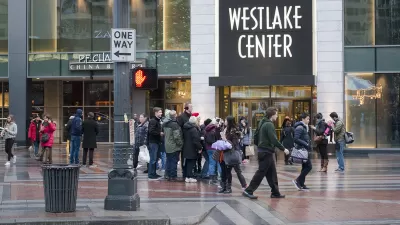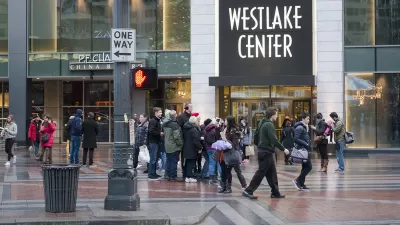With the plan update process for Seattle's Pedestrian Master Plan underway, one writer wonders why the plan is setting firmer goals for increased mode share.

Ryan Packer offers a critique of the Pedestrian Master Plan update currently underway at the Seattle Department of Transportation (SDOT). Noting that the number of commuters walking to work grew by 50 percent between 2010 and 2015, Packer determines that the plan update is disappointingly short on the kinds of goals that can further that progress.
For instance, Packer points out that the Pedestrian Master Plan lacks mention of the city's Vision Zero goal for 2035, and instead, "the goal is laid out as a decreasing rate of pedestrians involved in crashes."
Although Packer acknowledges the good intentions of the plan update, which includes mentions of pedestrian mode share, transit ridership, kids walking to school, and streetscapes, "without concrete goals to tell us just how successful our master plan is, we won’t be able to truly gauge success or failure."
Against this backdrop, Packer contrasts the Move Seattle levy, approved by voters in November 2015. That levy has a dashboard and a number of concrete targets to help residents track the success of that $930 million effort.
Back in August 2016, Packer also critiqued the implementation of the current version of the Pedestrian Master Plan, approved in 2009, focusing mostly on issue of maintenance and operations.
FULL STORY: Seattle’s Pedestrian Master Plan Is Short On Concrete Goals

Planetizen Federal Action Tracker
A weekly monitor of how Trump’s orders and actions are impacting planners and planning in America.

Restaurant Patios Were a Pandemic Win — Why Were They so Hard to Keep?
Social distancing requirements and changes in travel patterns prompted cities to pilot new uses for street and sidewalk space. Then it got complicated.

Map: Where Senate Republicans Want to Sell Your Public Lands
For public land advocates, the Senate Republicans’ proposal to sell millions of acres of public land in the West is “the biggest fight of their careers.”

Maui's Vacation Rental Debate Turns Ugly
Verbal attacks, misinformation campaigns and fistfights plague a high-stakes debate to convert thousands of vacation rentals into long-term housing.

San Francisco Suspends Traffic Calming Amidst Record Deaths
Citing “a challenging fiscal landscape,” the city will cease the program on the heels of 42 traffic deaths, including 24 pedestrians.

California Homeless Arrests, Citations Spike After Ruling
An investigation reveals that anti-homeless actions increased up to 500% after Grants Pass v. Johnson — even in cities claiming no policy change.
Urban Design for Planners 1: Software Tools
This six-course series explores essential urban design concepts using open source software and equips planners with the tools they need to participate fully in the urban design process.
Planning for Universal Design
Learn the tools for implementing Universal Design in planning regulations.
Heyer Gruel & Associates PA
JM Goldson LLC
Custer County Colorado
City of Camden Redevelopment Agency
City of Astoria
Transportation Research & Education Center (TREC) at Portland State University
Camden Redevelopment Agency
City of Claremont
Municipality of Princeton (NJ)




























